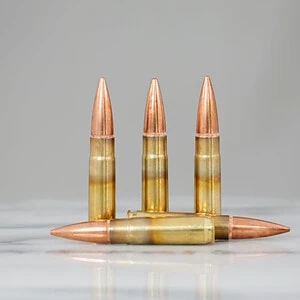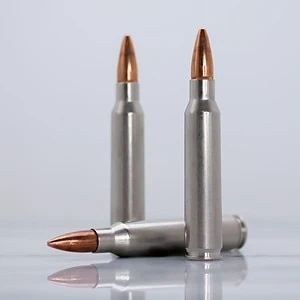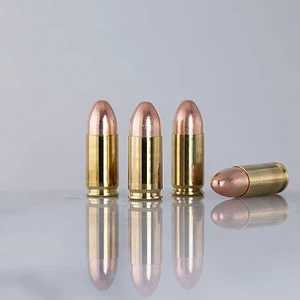What’s the Difference Between 9mm and 9mm Luger Rounds?
- Laura DiBenedetto
- Arm Yourself with Knowledge
If you’ve ever wondered about the difference between 9mm and 9mm Luger rounds, you’re not alone. In this blog, we’ll demystify these two popular calibers, explaining their nuances and helping you make informed choices for your shooting needs.
This is Topic 1 from Section 1 of our Comprehensive 9mm Caliber Guide: Understanding Ammunition and Performance.
History
9mm and 9mm Luger are often used interchangeably, and for good reason – they are essentially the same cartridge. 9mm refers to the bullet diameter, which measures 9 millimeters. However, the term “9mm Luger” specifically designates the ammunition developed by Georg Luger for the German arms manufacturer, Deutsche Waffen- und Munitionsfabriken (DWM), in the early 20th century.
The 9mm Luger round quickly gained popularity due to its reliability, manageable recoil, and widespread use in various firearms, including semi-automatic pistols. Now, let’s delve into the details and explore the key aspects that set these rounds apart:
Differences
- Bullet Design: Both rounds typically feature a bullet weight ranging from 115 to 147 grains. However, bullet designs can vary significantly. Hollow point (HP) bullets are designed for self-defense, as they expand upon impact, creating larger wound channels. Full metal jacket (FMJ) bullets, on the other hand, have a soft lead core encased in a harder metal shell, providing better penetration and reducing the risk of barrel fouling.
- Pressure Levels: While the rounds share similar dimensions, one subtle difference lies in the chamber pressure. The 9mm Luger round typically operates at a slightly higher pressure compared to standard 9mm rounds. However, most modern firearms chambered for 9mm can handle both variations without any issues, making them largely interchangeable.
- Availability: When it comes to availability, 9mm ammunition is more widely accessible, as it has become the go-to caliber for many law enforcement agencies and civilian shooters. Due to its extensive use and demand, 9mm ammunition is produced by numerous manufacturers worldwide. 9mm Luger rounds, being a specific designation, are less commonly labeled as such, but they are essentially the same as 9mm rounds.
Now that we’ve explored the differences between 9mm and 9mm Luger rounds, it’s essential to understand their practical implications. For most shooters, the variation between these two calibers is negligible, and both can be used interchangeably in firearms chambered for 9mm. However, it’s always crucial to consult your firearm’s manufacturer and refer to the owner’s manual to ensure compatibility.
Summary
In conclusion, the terms may initially appear confusing, but rest assured, they are essentially synonymous. Understanding their shared characteristics and minor differences empowers you to make informed decisions when purchasing ammunition for your firearm.
Remember, a thorough understanding of your equipment, including the ammunition you use, contributes to safe and enjoyable shooting experiences. So, whichever you choose, always prioritize safety. Practice proper firearm handling, and enjoy the world of shooting responsibly.
Ready to Learn More? Explore our Comprehensive Guide:
Section 1: Understanding Ammunition
What’s the Difference Between 9mm and 9mm Luger Rounds?
Explore the subtle differences between these frequently used terms and develop a comprehensive grasp of their interchangeable nature. Gain insight into the relationship between 9mm rounds and 9mm Luger rounds, unraveling the factors that contribute to the diverse terminology surrounding them.
Exploring the Power: What is the Hardest Hitting 9mm Ammo?
Discover the leading contenders in the realm of high-impact 9mm ammunition. Dive deep into the elements that contribute to their exceptional power, such as bullet weight, velocity, and energy. Explore a selection of options that deliver a forceful impact and leave a lasting impression.
Section 2: Caliber Compatibility and Performance
Do All 9mm Bullets Fit All 9mm Guns? Exploring Compatibility and Considerations
Gain valuable insights into the compatibility of 9mm bullets with various 9mm firearms. Develop a comprehensive understanding of the key factors that influence compatibility, including chamber specifications and pressure levels. Explore essential considerations that will guide you in selecting the perfect ammunition for your specific firearm.
Can a Regular 9mm Shoot 9mm Luger? Understanding Caliber Compatibility
Discover the truth about the compatibility of a standard 9mm firearm with 9mm Luger ammunition. Delve into the specifications, pressure levels, and crucial safety considerations that play a vital role in ensuring the optimal functioning and performance of your firearm.
Section 3: Exploring Firearm Calibers
What Grain 9mm Do Police Use? Exploring Police Ammunition Choices
Explore the realm of 9mm ammunition choices in law enforcement agencies. Uncover the grain preferences and factors carefully weighed by police departments when selecting their duty ammunition. Gain valuable insights into the trusted ammunition choices relied upon by professionals in the field.
Is .45 More Lethal Than 9mm? Debunking the Myth and Examining Firearm Caliber Effectiveness
Dive into the enduring debate surrounding .45 caliber versus 9mm ammunition. Uncover the truth about the effectiveness and stopping power of these calibers, dispelling common misconceptions along the journey. Gain a comprehensive understanding of the factors that impact caliber performance in self-defense situations.
Section 4: Self-Defense Effectiveness
Will a 9mm Stop a Threat? Unveiling the Effectiveness of the 9mm Caliber in Self-Defense
Uncover the reality behind the effectiveness of the 9mm caliber in self-defense scenarios. Explore key factors like bullet design, terminal ballistics, and shot placement that play a role in the stopping power of the 9mm round. Gain valuable insights into why the 9mm is widely chosen for self-defense purposes.

Best Sellers
Join the Revolution.
Join the Sovereign Family and get the one email you’ll look forward to. Get promos, coupon codes, and even Dad jokes! 100% spam-free.




